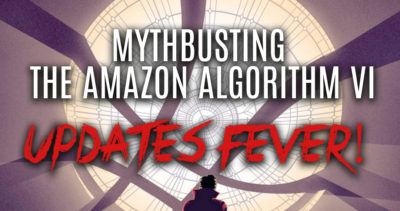In the last months there have been claims that Amazon’s A10 algorithm has been updated to negative effect for indie authors. This has seen many freakouts on forums as to what this means for selling books on Amazon. Here, indie book marketing expert Cate Baum clears up a few common misunderstandings, and how you can help your sales on Amazon with the changes seen.
MYTH 1. Amazon has weighted all indie books down in ranking since the algorithm update.
TRUTH: Yes and no.
The previous search engine made sure that clicks to books counted as part of the popularity “soup” for being shown in customer searches. Internal clicks from Amazon ads onsite, for example, will no longer hold as much weight for book popularity in the new algorithm, as Amazon is trying to lean towards what people are looking for without prompting to get a more “organic” picture of buyer behavior. I’m not sure if this means Amazon Ads are useless now, as surely they can still lead to sales, which in turn would give the book the ultimate algorithm Brownie Point — a sale. It now may be better to invest less money in PPC Ads on Amazon and more on other methods of marketing that will lead to organic sales instead, i.e. offsite driving to Amazon Book Pages.
It’s also true that in September 2019 The Wall Street Journal claimed that engineers working on the A10 algorithm had leaked information that said that Amazon had “optimized its algorithm that ranks listings so that instead of showing customers mainly the most-relevant (sic) and best-selling list items when they search — as it had been for more than a decade — the site also gives a boost to items that are more profitable.” But this has always been the case. If you sell a lot of books, Amazon will promote your book harder than if you sell a handful. This ends up being the same as always: promote your book to sell books, then Amazon will help you out and show your book in more searches.
Therefore, it is probably true that books that do not sell consistently over a period of time will now not rank higher for longer, as products with track history will be promoted more often, but that just means what we have always known: On Amazon, the only way to sell books is to sell books.
MYTH 2: The new algorithm misleads customers to prefer traditionally-published books that make more money for Amazon.
TRUTH: Amazon has always given preferential treatment to trad books for one reason: They sell more copies on average anyway.
However, if an indie or self-published book can sell as many or more copies than a trad book, then it will be treated as a “profitable product” for Amazon, and you will see the book being promoted naturally in the search engine, as more sales means more popularity for that title, i.e. more people like that book, so it follows that it is more likely other people might like it. This again comes down to ensuring you sell steadily and have Verified Reviews to prove that people like your book and will buy and review it.
MYTH 3: The way the algorithm ranks products has changed completely, to the detriment of indie books.
TRUTH: There have been changes in how a product is ranked on Amazon.
But not to the detriment of indie authors. In fact, here you have a great chance to GAIN RANK.
Here you can see how variables were prioritized by Amazon previously, and how they are now:
What do these changes mean for authors?
- It’s going to be much harder to gain quick and easy ranking through one-day promotional blasts, as Amazon will now reward sales over time and not in real-time, i.e. no book sold for days then suddenly fifty sales. So when you choose a promo product, it may be wise to go for those that get you sales and reviews before ranking.
- Use sales promos several times in smaller numbers to gain sales history within Amazon before going for a big promotional blast. This will build a reputation in Amazon before going bananas with huge expensive promotions.
- Exposure may come from getting into “Frequently Bought With” etc. rather than Best Seller Ranking by promoting with sales. This means encouraging buyers to buy your book at the same time as very highly popular books in the same checkout could be a better way to gain sales.
- Having a good, professional Book Page has reached peak importance, as has having Verified Customer Reviews and Editorial Reviews on your page.
- Working with promotional methods offsite going to your page is more successful for ranking than using internal ads on Amazon. For instance, encouraging readers to search for your book title instead of providing the link to Amazon may be more successful for ranking and exposure.
SPR Products and Services that could help:
1. For the best Amazon Book Page you can get, use our Amazon Book Page Revamp Service
2. Buy our Reader Recommended Add-On when you order your Promo, which will recommend highly popular Best Sellers alongside your eBook to encourage sales in the same checkout to get the “Frequently Bought Together” or “Customers who bought this item also bought” exposure on Amazon.
3. Use our Amazon Reviews Promotion Service to garner Verified Customer Reviews via our mailer.
4. Use our Review Builder Service to build your Editorial Reviews section
5. Use our 50 Extra Sales Promo to build sales reputation over time before going for the big one.
Get an Editorial Review | Get Amazon Sales & Reviews | Get Edited | Get Beta Readers | Enter the SPR Book Awards | Other Marketing Services























Leave A Comment